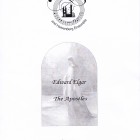Apostles 2015St Andrews Chorus
Read more about the opera Apostles
Of Elgar's oratorios, only The Dream of Gerontius is heard frequently in Scotland. The Kingdom is performed from time to time by the choral societies, but The Apostles really is quite a rarity nowadays. A further difficulty is that The Apostles makes enormous demands on the performers who participate in our thriving amateur choral scene, whether singers or orchestras.
There are tremendous logistical difficulties in performing the work at all. The choir is large, augmented with a semi-chorus for several sections. The men and a smallish contingent of women, occupy the choirstalls. Most of the ladies are in the balcony either side of the stage - some with no more sight of the conductor than the back of his head. Then there are the Apostles themselves - five tenors and seven baritones or basses lined up at the front of the stage, to the conductor's right. Three of these, John, Peter and Judas, are significant soloists. The other characters, Jesus, Mary and Mary Magdalene, stand to the left. In the midst of this assembly lies the orchestra. This is the most complex score that Elgar had produced to this point of his career, and his full complement of players would have filled the stage on their own. The beauty and subtlety of the orchestration was displayed by these slightly reduced forces to a quite amazing degree, with climaxes beautifully paced under Michael Downes.
An excellent team of soloists had been recruited, and they all made a good impression, with a judicious mixture of youth and experience. The two young baritones really should be mentioned first. The voices of Andrew McTaggart and Ben McAteer have been steadily nursed and developed over several years now, and they seem to gain in artistry with every performance, with a wealth of unforced lyricism throughout their wide-ranging music.
Wilma MacDougall has maintained a beautifully pure soprano, and Tania Holland Williams, perhaps not naturally possessing the sepulchral contralto tones Elgar envisaged, sensibly resisted any temptation to force, and did well as a result. Jamie MacDougall added to his Elgarian roles with a highly successful portrayal of John. The veteran Brian Bannatyne-Scott made a rare appearance on home turf, revealing a voice apparently untouched by the years, a warm, smoothly produced sound with effortlessly clear diction. Indeed the clarity of enunciation by all the soloists was a notable achievement.
There were a few minor quibbles. Given the technical difficulties of performing with such a large group, the number of technical fluffs was remarkably small - the only point when things threatened to come apart was at Peter's denial, when the ladies' soft singing went briefly out of kilter. That was a rare moment of difficulty. The only other problem was really another factor of the choral layout, as the words of the full choir were sometimes far from clear - perhaps as some of the voices were projecting across rather than into the hall. In all, this was a superbly enjoyable performance of an unusual work that shows St Andrews musical life to be in fine fettle. These Elgar works really should be a staple of the Edinburgh Festival concert repertoire.


